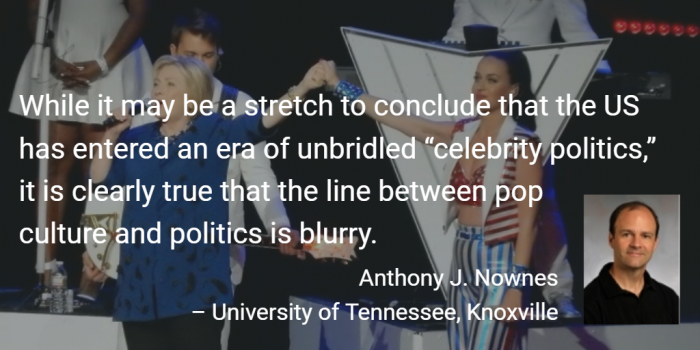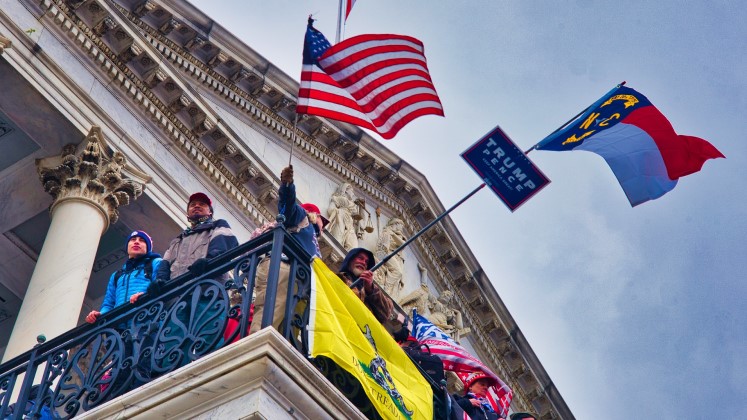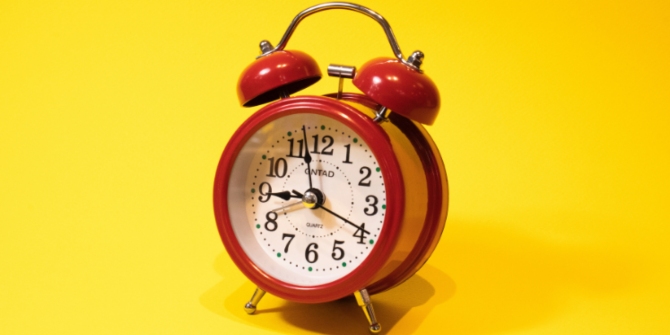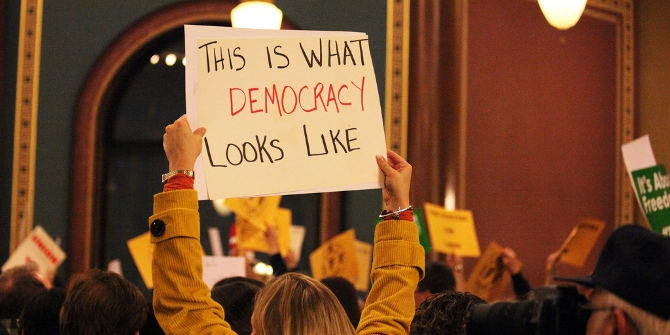 In the 2016 election actors, musicians, and athletes publicly endorsed political candidates with the hopes that their celebrity could bring attention, and ultimately votes, to their preferred candidates. Research by Anthony J. Nownes shows us that many times this does work- survey respondents who were aware of Hillary Clinton’s celebrity endorsements had lower levels of anger and anxiety towards the candidate than other respondents.
In the 2016 election actors, musicians, and athletes publicly endorsed political candidates with the hopes that their celebrity could bring attention, and ultimately votes, to their preferred candidates. Research by Anthony J. Nownes shows us that many times this does work- survey respondents who were aware of Hillary Clinton’s celebrity endorsements had lower levels of anger and anxiety towards the candidate than other respondents.
While it may be a stretch to conclude that the United States has entered an era of unbridled “celebrity politics,” it is clearly true that Americans live in an era in which the line between pop culture and politics is blurry. Celebrities run for and win public office, they endorse candidates regularly, and they regularly use pop culture styles. Nonetheless, social scientists know very little about celebrity politics. In a recent study, I attempted to learn more about celebrity politics in the United States by attempting to determine how celebrity endorsements affect voter emotions. I focused on celebrity endorsements because endorsing candidates is by far the most common and prominent form of (public) celebrity political activity. I focused on emotions because there is substantial evidence (mostly in the business and marketing literature) that endorsements can directly affect them, and because there is now a considerable literature showing that emotions such as anger, anxiety, and enthusiasm directly affect political attitudes and behavior.
Do celebrity endorsements of candidates affect voters’ emotions toward these candidates? To address this question, I conducted a randomized, post-test only, control group experiment during the waning days of the 2016 American presidential election in which some of the 618 college student respondents in the treatment group were exposed to factual information about popular celebrity support for Democratic presidential candidate Hillary Clinton.

To uncover how voters’ emotions toward Hillary Clinton might change in response to information about popular celebrities supporting her, I randomly assigned my 618 respondents to one of two groups—the control group (n=319), or the stimulus group (n=299). On the day of the experiment, I administered a survey to both groups. Respondents in the control group received a brief questionnaire which queried them about their political attitudes and affiliations (e.g., 2012 vote choice, party identification), and their personal characteristics (e.g., age, academic major, family income, race/ethnicity). The survey concluded with a battery of items designed to measure respondents’ levels of anger, anxiety, and enthusiasm toward Democratic candidate Hillary Clinton. Respondents in the treatment group received the identical survey with one key difference; embedded in the treatment group survey was this “news item,” which served as the stimulus:
ELECTION 2016: HILLARY CLINTON GETS BY WITH A LITTLE HELP FROM HER CELEBRITY FRIENDS
The 2016 presidential election is still over a month away, but the campaign is in full swing. The election of 2016–which pits Democratic nominee Hillary Clinton against Republican nominee Donald Trump–is shaping up to be one the closest in decades. But Hillary Clinton may have a number of “secret weapons”—Hollywood celebrities. Hillary Clinton has won the endorsements of several Hollywood celebrities, including actors George Clooney, Robert DeNiro, and Tom Hanks, actresses America Ferrera, Tina Fey, Amy Poehler, and Reese Witherspoon, talk show host Ellen DeGeneres, former basketball star Earvin “Magic” Johnson, and director Steven Spielberg. Outside Hollywood, many other celebrities are lining up behind Hillary Clinton as well, including singers Tony Bennett, Elton John, Merle Haggard, and Katy Perry, and novelist Anne Rice. Many of these celebrities took to Instagram and Twitter to show their support for Hillary Clinton shortly after she announced her presidential run early last year.
Respondents in the treatment group were exposed to a brief (entirely factual) news story reporting that several very popular celebrities had endorsed Hillary Clinton for president.
Overall, my statistical results support the general notion that celebrity endorsements can indeed affect voters’ emotions toward candidates. First, respondents in the treatment group had lower levels of anxiety toward Hillary Clinton than respondents in the control group did. Second, respondents in the treatment group had lower levels of anger toward Hillary Clinton than respondents in the control group did. In other words, learning that a slew of popular celebrities had endorsed Hillary Clinton lowered respondents’ levels of anger and anxiety toward her. The reductions in the levels of the negative emotions of anxiety and anger were quite substantial (on the order of 7-8 percent), and seem even more so when we consider that they occurred after only a single exposure to a brief news item.
The question of how all of this might have affected voters’ decisions on Election Day is a complicated one, primarily because research indicates that the emotions of anger and anxiety affect levels of participation, how voters evaluate candidates, and the extent to which voters look for new information during campaign season more than they affect vote choice per se. Thus, to determine the ultimate impact of celebrity endorsements on vote choice, further research is necessary. For now, however, my data suggest that celebrities can affect voters’ emotions during campaign season.
“Hillary Clinton With Katy Perry At The I’m With Her Concert for Hillary Clinton at Radio City Music Hall” by slgckgc is licensed under CC BY 2.0.
This article was based on the paper Celebrity Endorsements and Voter Emotions: Evidence From Two Experiments in American Politics Research.
Please read our comments policy before commenting.
Note: This article gives the views of the author, and not the position of USAPP – American Politics and Policy, nor of the London School of Economics.
Shortened URL for this post: http://bit.ly/2vtKHUk
_________________________________
 Anthony J. Nownes – University of Tennessee, Knoxville
Anthony J. Nownes – University of Tennessee, Knoxville
Anthony Nownes is Professor of Political Science at the University of Tennessee, Knoxville. Most of his research focuses upon interest group politics in the United States. His book, Total Lobbying: What Lobbyists Want (and How They Try to Get It) was published by Cambridge University Press in 2006. He is currently working on a number of projects, including one that examines the role of lobbyists in the government procurement process.







1 Comments